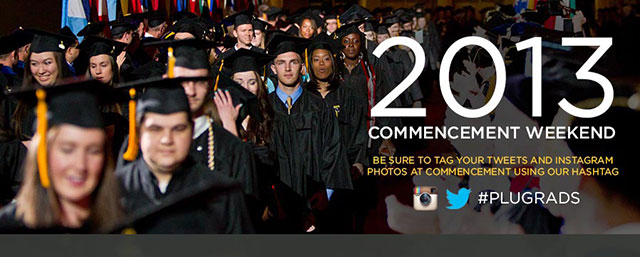Page 10 • (110 results in 0.067 seconds)
-

For the 2012-2013 academic year, 877 students will have graduated from PLU. Spring Commencement takes place Sunday, May 26 in the Tacoma Dome. (Photo by John Froschauer) In their own words Compiled and edited by Chris Albert This spring, new PLU graduates closed a chapter…
too small), it was nearby my home (but not too close), and it had a great study away center. Plus it was located in the lovely Pacific Northwest. The choice was pretty obvious. My PLU experience: While at PLU I have been able to dabble in all different kinds of subjects. From human anatomy and physiology to political philosophy, I have enriched and broadened my understanding of the world. Through this journey I have discovered some wonderful professors who continue to support and encourage me
-
YouTube Short: Keep up the kindness Follow Zari as she asks the PLU community: What is the nicest thing someone at PLU has done for you? #LutesCenterCommunity Posted by: mhines / April 8, 2024 April 8, 2024 Read Previous You Ask. We Answer. How is your Psychology Program? Read Next Take a peak inside Comparative Vertebrate Anatomy LATEST POSTS PLU Scores 4.5 out of 5 on Campus Pride Index: What does that mean? November 21, 2024 YouTube Short: A quick campus tour and Lute lingo with Zari Warden
-
Course Title ANTH 101 Introduction to Human Biological Diversity - NW BIOL 111 Biology and the Modern World - NW BIOL 116 Introductory Ecology - NW BIOL 201 Introductory Microbiology - NW BIOL 205 Human Anatomy and Physiology I - NW BIOL 206 Human Anatomy and Physiology II - NW BIOL 225 Molecules, Cells, and Organisms - NW BIOL 226 Genes, Evolution, Diversity, and Ecology - NW CHEM 103 Food Chemistry - NW CHEM 104 Environmental Chemistry - NW CHEM 115 General Chemistry I - NW CHEM 116 General
-
Original BSN Curriculum (to be retired at the end of Spring 2023) Year 1 FallBIOL 205 Human Anatomy and Physiology I PSYC 101 Introduction to Psychology WRIT 101 Writing Seminar PHED 100 Personalized Fitness4 Credits 4 Credits 4 Credits 1 Credit January TermGeneral Education Program Element (GenEd) First-Year Residency Requirement PHED Physical Activity4 Credits 1 Credit SpringBIOL 206 Human Anatomy and Physiology II CHEM 105 Chemistry of Life General Education Program Element (GenEd) Inquiry
-
New Curriculum, Beginning Fall 2021 Prerequisites Biology 205 – Anatomy and Physiology I Biology 206 – Anatomy and Physiology II Chemistry 105 – Chemistry of Life (Intro into Organic and Biochemistry Biology 201 – Introduction to Microbiology Psychology 320 – Development Across the Lifespan (Psychology 101 – Introduction to Psychology is a prerequisite to Psychology 320) Statistics 231 – Introductory Statistics Nursing 120 - Nutrition Junior Year Semester 1 NURS 305 - Patho/Pharm I NURS 306
-
Education Requirements (4) PHEDPhysical Education Activity Class (1) Fall Entry - Sophomore Year Fall of Sophomore Year BIOL 205**Human Anatomy & Physiology I (4) General Ed***Courses toward fulfillment of General Education Requirements (4) January of Sophomore Year General Ed***One course toward fulfillment of General Education Requirements (4) on campus or Study Away Spring of Sophomore Year BIOL 206**Human Anatomy & Physiology II (4) BIOL 201**Introductory Microbiology (4) PSYC 320**Development
-
our daily lives through its broad application, such as to medicine, agriculture, and technology. Students in Comparative Vertebrate Anatomy work on reconstructing a gray whale skeleton. Professor Brian Naasz and ENVT 350 students take samples from the local Clover Creek Watershed. Physics major Julian Kop '24 makes an adjustment to the telescope during research with Professor Sean O'Neill. MissionWe educate students within the liberal arts tradition to apply scientific and quantitative reasoning
-

) Hometown: Saipan, Northern Mariana Islands Major: Nursing Campus Involvement: Delta Iota Chi (nursing honor society), Blood Drive Coordinator, Rieke Diversity Scholar What she is doing now: Neuro-Trauma PCU Nurse at St. Joseph Medical Center (Tacoma) Nathan Adams '20 Nathan Adams ‘20 (he/him) Hometown: Federal Way, Washington Major: Kinesiology Campus Involvement: Jazz Ensemble, Residential Life, Ultimate Team, Platonic (acapella group) What he is doing now: Masters student studying exercise physiology
-
Frequently Asked QuestionsWhat are the average GPA and GRE scores for admitted students for the ELMSN pathway?Average Cum. GPA: 3.4-3.6 Average Prerequisite GPA: 3.5-4.0 Please note: The GRE is now optional Average GREs of admitted students before GRE requirement change: Verbal: 155 (145-165) Quantitative: 153 (145-161) Analytical Writing: 4.5 (3.5-5.5) What are the grade and timeline requirements for the prerequisite courses?Minimum grade of 3.0/‘B’ in each course: Human Anatomy & Physiology I
-
. Basic principles and strategies of treatment for common sexual dysfunctions will be considered. The nature of sexual health, a brief review of the anatomy and physiology of the sexual response cycle and the biological and psychological determinants of sexual functioning will be considered. Students will learn to conduct a sexual history, considering the impact of larger contextual issues. Models of couples therapy will also be taught with attention to addressing sexual issues as another form of
Do you have any feedback for us? If so, feel free to use our Feedback Form.


